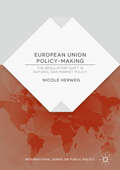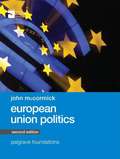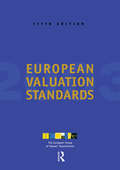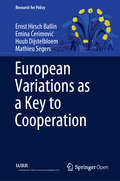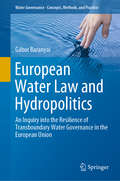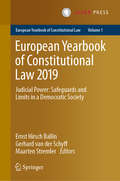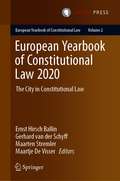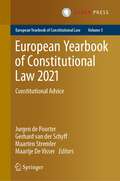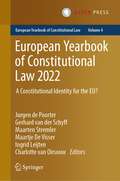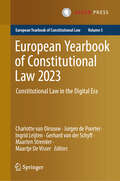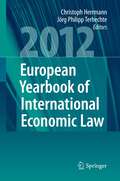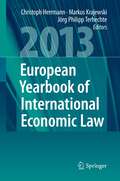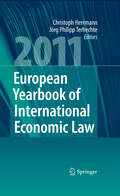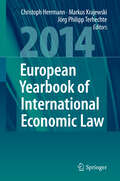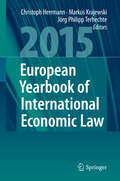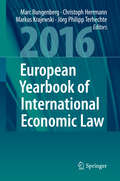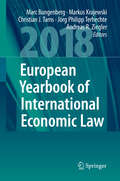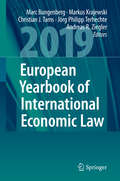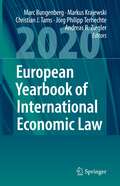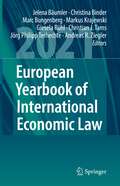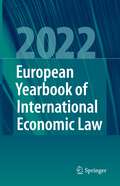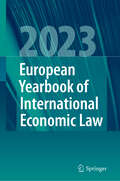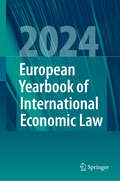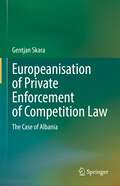- Table View
- List View
European Union Policy-Making
by Nicole HerwegThis book furthers the ongoing theoretical development of the multiple streams framework, assessing its applicability to European Union (EU) policy-making processes. It systematically defines and identifies functional equivalents for all of the framework's core concepts at the EU level and extends the framework in order to explain agenda-setting and decision-making. Furthermore, the book derives a set of explicit hypotheses to empirically assess the extent to which the (modified) framework is able to explain timing, agenda prominence, and policy change (or a lack thereof) for the EU natural gas directives passed in 1998, 2003, and 2009. The analysis documents that the framework is well-suited to explain the EU policy process in general and reveals where additional theoretical refinements are required.
European Union Politics (Palgrave Foundations Series)
by John McCormickEuropean Union Politics provides an authoritative introduction to all aspects of politics and policy in the EU. It gives readers a sense of the colour and flavour of EU politics, while systematic coverage of different theoretical perspectives encourages a more sophisticated understanding of how and why the EU has become what it is today.
European Valuation Standards 2003
by TEGoVAFirst Published in 2003. This edition of the Standards has been the second to be issued for public consultation taking into account many of the comments submitted to it by individuals, companies and professional bodies. Users of the book should use the Standards and Guidance Notes as a reference tool for the sixteen comprehensive objective within.
European Variations as a Key to Cooperation (Research for Policy)
by Huub Dijstelbloem Ernst Hirsch Ballin Emina Ćerimović Mathieu SegersThis Open Access book offers a novel view on the benefits of a lasting variation between the member states in the EU. In order to bring together thirty very different European states and their citizens, the EU will have to offer more scope for variation. Unlike the existing differentiation by means of opt-outs and deviations, variation is not a concession intended to resolve impasses in negotiations; it is, rather, a different structuring principle. It takes differences in needs and in democratically supported convictions seriously. A common core remains necessary, specifically concerning the basic principles of democracy, rule of law, fundamental rights and freedoms, and the common market. By taking this approach, the authors remove the pressure to embrace uniformity from the debate about the EU’s future. The book discusses forms of variation that fall both within and outside the current framework of European Union Treaties. The scope for these variations is mapped out in three domains: the internal market; the euro; and asylum, migration and border control.
European Water Law and Hydropolitics: An Inquiry into the Resilience of Transboundary Water Governance in the European Union (Water Governance - Concepts, Methods, and Practice)
by Gábor BaranyaiThis book provides the first comprehensive assessment of the various issues faced by countries in the European Union, where progressing climate change and urbanization pose significant cooperative challenges in a large number of river basins. Conducting a thorough analysis of the intricate web of EU water governance, it reveals that the hydropolitical stability of the European Union is already at risk. Further, given the structural nature of the shortcomings in EU water policy—e.g. the rigidity of the EU’s founding treaties or the institutional complacency of the European Commission—the book argues that these risks are likely to turn into sources of prolonged conflict, unless EU decision-making bodies take steps to address the new hydrological realities early on.
European Yearbook of Constitutional Law 2019: Judicial Power: Safeguards and Limits in a Democratic Society (European Yearbook of Constitutional Law #1)
by Gerhard van der Schyff Ernst Hirsch Ballin Maarten StremlerThe European Yearbook of Constitutional Law (EYCL) is an annual publication initiated by the Department of Public Law and Governance at Tilburg University and devoted to the study of constitutional law. It aims to provide a forum for in-depth analysis and discussion of new developments in the field, both in Europe and beyond.This inaugurate volume examines the safeguards and limits of judicial power in a variety of constitutional systems, both at the national and supranational level. The book approaches the judiciary as part of the constitutional system operating within a legal order that connects the citizens and institutions of the state to each other. Looking at the judiciary from this broader perspective, the traditional doctrine of the separation of powers would appear no longer to adequately represent the diversity and complexity of constitutional systems and their democratic legitimacy. Judicial independence does not mean isolation, but should better be understood as institutionalizing relationships that legitimize the power of the courts. The notions of ‘safeguards’ and ‘limits’ indicate the reciprocally enabling and protecting nature of these relationships. In recognition of this, the contributions to this volume analyse these safeguards and limits as relations existing within a complex constitutional architecture.State institutions, today, are involved in a fundamental transformation of their selfunderstanding as a result of changes in political culture. Several contributions to this volume provide examples of political criticism and pressure on the judiciary, against which the usual guarantees are unable to provide adequate protection. A convincing and effective response to threats to the judiciary’s independence requires a detailed and precise analysis of the judiciary’s constitutional safeguards and limits. This book offers a step in that direction.
European Yearbook of Constitutional Law 2020: The City in Constitutional Law (European Yearbook of Constitutional Law #2)
by Gerhard van der Schyff Ernst Hirsch Ballin Maartje De Visser Maarten StremlerThe European Yearbook of Constitutional Law (EYCL) is an annual publication devoted to the study of constitutional law. It aims to provide a forum for in-depth analysis and discussion of new developments in the field, both in Europe and beyond. This second volume examines the constitutional positioning of cities across space and time. Unrelenting urbanisation means that most people are, or soon will be, living in cities and that city administrations become, in many respects, their quintessential governing units. Cities are places where State power is operationalised and concretised; where laws and government policies transform from parchment objectives to practical realities. In a similar vein, cities are also places for the realisation of the constitutional rights and liberties enjoyed by individuals. The book is organised around three sets of relations that await further unpacking in theory as well as practice: that between cities and other institutions in the national constitutional architecture; that between cities and their inhabitants; and that between cities and international organisations. The contributions to this book show the marked diversity in the role and powers available to cities in Europe and beyond, and identify principles and approaches to help stipulate new ways of thinking about the legal role and relevance of cities going forward. Ernst Hirsch Ballin is distinguished university professor at Tilburg University and vice-dean for research of Tilburg Law School. Gerhard van der Schyff is associate professor at Tilburg Law School, Department of Public Law and Governance. Maarten Stremler is lecturer at Maastricht University, Faculty of Law, Department of Public Law. Maartje De Visser is associate professor at SMU School of Law, Singapore.
European Yearbook of Constitutional Law 2021: Constitutional Advice (European Yearbook of Constitutional Law #3)
by Gerhard van der Schyff Maartje De Visser Jurgen De Poorter Maarten StremlerThe European Yearbook of Constitutional Law (EYCL) is an annual publication devoted to the study of constitutional law. It aims to provide a forum for in-depth analysis and discussion of new developments in the field, both in Europe and beyond. This third volume of the EYCL focuses on constitutional advice, an underexplored topic of legal scholarship today, and addresses this situation by looking beyond constitutional law’s familiar focus on the classic separation of powers and the main legislative, executive and judicial bodies implied by this construct. The attention is shifted to mapping and analysing the advisory bodies and functions grouped around and in support of the legislators, administrators and judges at the frontline of the constitutional edifice, which is accomplished through national, comparative and transnational perspectives on constitutional advice from Europe and beyond. Addressing the topic of constitutional advice is necessary to broaden and deepen not only our understanding of advice as a field in its own right, but also as a way of rendering a fuller account of contemporary constitutionalism. Also, the increasing political polarisation across many societies today underscores the need to study constitutional advice on topics of significance in an attempt to bridge divides and end gridlock.This book will be of special interest to constitutional scholars and legal scholars more generally, as well as to political scientists. In addition, government officials, judges and policy-makers wishing to better understand the legal mechanisms and avenues when it comes to rendering or receiving advice in the contemporary constitutional context will find much of relevance. Jurgen de Poorter is professor at Tilburg Law School, Department of Public Law and Governance. Gerhard van der Schyff is associate professor at Tilburg Law School, Department of Public Law and Governance. Maarten Stremler is assistant professor at Maastricht University, Faculty of Law, Department of Public Law. Maartje De Visser is associate professor at Yong Pung How School of Law, Singapore Management University, Singapore.
European Yearbook of Constitutional Law 2022: A Constitutional Identity for the EU? (European Yearbook of Constitutional Law #4)
by Gerhard van der Schyff Ingrid Leijten Maartje De Visser Jurgen De Poorter Maarten Stremler Charlotte Van OirsouwThe European Yearbook of Constitutional Law (EYCL) is an annual publication devoted to the study of constitutional law. It aims to provide a forum for in-depth analysis and discussion of new developments in the field, both in Europe and beyond. This fourth volume of the EYCL addresses the underexplored and contentious topic of whether the EU possesses a constitutional identity of its own. To date, the main focus of scholarship and case law concerns the constitutional identities of the Member States of the EU. This is because the EU has to respect such identities according to article 4(2) TEU.The attention for Member States’ constitutional identities stands in stark contrast to the notion of an EU constitutional identity. Such an identity features very little in the literature and debate on constitutional identity and the legal architecture of the EU. Consequently, this edition of the EYCL addresses the gap in legal research by studying constitutional identity with a focus on the EU itself. The book explores various views on whether the EU possesses such an identity and what any possible identity might entail. In this way, a fuller and more inclusive picture can be formed of constitutional identity as it relates to the multilevel constitutional order inhabited by the EU and its Member States.This volume will be of special interest to constitutional and legal scholars who are interested in EU and national constitutional law, as well as to political scientists. In addition, the book is relevant for judges, government officials, judges and policy-makers who work with EU (constitutional) law and its relationship with national (constitutional) law.Jurgen de Poorter is State Councillor at the Dutch Council of State and professor at Tilburg Law School, Department of Public Law and Governance. Gerhard van der Schyff is associate professor at Tilburg Law School, Department of Public Law and Governance. Maarten Stremler is assistant professor at Maastricht University, Faculty of Law, Department of Public Law. Maartje De Visser is associate professor at SMU School of Law, Singapore. Ingrid Leijten is professor at Tilburg Law School, Department of Public Law and Governance. Charlotte van Oirsouw is PhD researcher at Utrecht University, Department of Constitutional and Administrative Law.
European Yearbook of Constitutional Law 2023: Constitutional Law in the Digital Era (European Yearbook of Constitutional Law #5)
by Gerhard van der Schyff Ingrid Leijten Maartje De Visser Jurgen De Poorter Maarten Stremler Charlotte Van OirsouwThe European Yearbook of Constitutional Law (EYCL) is an annual publication devoted to the study of constitutional law. It aims to provide a forum for in-depth analysis and discussion of new developments in the field, both in Europe and beyond. This book addresses the theme Constitutional Law in the Digital Era. Societies are increasingly affected by the use of digital technologies by both public and private actors. This has resulted in a range of normative questions that require a constitutional response. The book explores a number of issues concerning the relationship between the impact of digitalisation and constitutional values by examining the constitutional challenges arising from the increasing use of digital technologies and develops potential constitutional responses and remedies to these challenges. This volume will be of special interest to constitutional and legal scholars who are interested in EU and national constitutional law, as well as to social scientists more generally (e.g. governance, sociology, science and technology, as well as computer and data scientists). In addition, the book is relevant for judges, government officials and policy-makers who work on the intersection of digitalisation and (EU) constitutional law. Charlotte van Oirsouw is a PhD researcher at Utrecht University School of Law, Department of Constitutional and Administrative Law. Jurgen de Poorter is State Councillor at the Dutch Council of State and Professor at Tilburg Law School, Department of Public Law and Governance. Ingrid Leijten is Professor at Tilburg Law School, Department of Public Law and Governance. Gerhard van der Schyff is Associate Professor at Tilburg Law School, Department of Public Law and Governance. Maarten Stremler is Assistant Professor at Maastricht University, Faculty of Law, Department of Public Law. Maartje De Visser is Professor at Yong Pung How School of Law, Singapore Management University. Chapter 10 is available open access under a Creative Commons Attribution 4.0 International License via link.springer.com.
European Yearbook of International Economic Law (EYIEL), Vol. 3
by Christoph Herrmann Jörg Philipp TerhechteThe third volume of the European Yearbook of International Economic law focuses on two major topics of current academic and political interest. Firstly, it adresses the 10th anniversary of China's accession to the WTO and its implications; secondly, it deals with different legal aspects of global energy markets.
European Yearbook of International Economic Law (EYIEL), Vol. 4
by Markus Krajewski Christoph Herrmann Jörg Philipp TerhechtePart one of Volume 4 (2013) of the European Yearbook of International Economic Law offers a special focus on recent developments in international competition policy and law. International competition law has only begun to emerge as a distinct subfield of international economic law in recent years, even though international agreements on competition co-operation date back to the 1970s. Competition law became a prominent subject of political and academic debates in the late 1990s when competition and trade were discussed as one of the Singapore issues in the WTO. Today, international competition law is a complex and multi-layered system of rules and principles encompassing not only the external application of domestic competition law and traditional bilateral co-operation agreements, but also competition provisions in regional trade agreements and non-binding guidelines and standards. Furthermore, the relevance of competition law for developing countries and the relationship between competition law and public services are the subject of heated debates. The contributions to this volume reflect the growing diversity of the issues and elements of international competition law. Part two presents analytical reports on the developments of the regional integration processes in North America, Central Africa and Southeast Asia as well as on the treaty practice of the European Union. Part three covers the legal and political developments in major international organizations that deal with international economic law, namely the IMF, WCO, WTO, WIPO, ICSID and UNCTAD. Lastly, part four offers book reviews of recent works in the field of international economic law.
European Yearbook of International Economic Law 2011
by Christoph Herrmann Jörg Philipp TerhechtePart one of Vol. 2 (2011) of the European Yearbook of International Economic Law adresses two major topics of current academic debate and public interest: firstly, it focuses on the State and the Global Economy, secondly, on Climate Change and International Economic Law. Part two contains treatises of recent regional integration developments taking place in the major regions of the world. Part three covers the legal and political developments in the major international organizations and fora dealing with international economic policy making. Part four contains book reviews of recent works in the field of International Economic Law.
European Yearbook of International Economic Law 2014
by Markus Krajewski Christoph Herrmann Jörg Philipp TerhechteIn 2014, the global economic system celebrates two anniversaries: Seventy years ago, on 22 July 1944 at Bretton Woods, New Hampshire, the Articles of Agreement of the International Monetary Fund (IMF) and the Articles of Agreement of the International Bank for Reconstruction and Development (Worldbank) were adopted. Since then the global financial and monetary system underwent significant policy changes, but the institutional framework remained the same. More recently, twenty years ago, on 15 April 1994, the Final Act of the Uruguay Round of Multilateral Trade Negotiations was signed and its key component, the Agreement establishing the World Trade Organization, entered into force on 1 January 1995. Even though the beginning of the multilateral trading system dates back to the late 1940s, the founding of the WTO constitutes a significant institutional reform which marks the beginning of a new era. Anniversaries are usually moments of celebration. However, even a superficial observer will notice that neither the current international financial and monetary regime nor the international trade regime is in a stage which invites celebration. Instead, both are facing difficult and fundamental challenges to their very existence from the outside but also from within. So while there may be no time to celebrate, anniversaries are also often used for reflection about the past and the future. Hence, EYIEL 5 (2014) considers these two anniversaries ample moments to reflect on the legacy and the current status of the main two pillars of International Economic Law in its Part one. Part two of EYIEL 5 (2014) brings together contributions on the EU’s Deep Trade Agenda, on Current Approaches to the International Investment Regime in South America, on the Multilayered System of Regional Economic Integration in West Africa and on the Tripartite Free Trade Area, as well as on India and her Trade Agreements. Part three contains treatises of developments in the World Customs Organization, the World Intellectual Property Organization and in International Investment Law. After the book reviews in Part four, EYIEL 5 (2014) is complemented with an Annex containing the Case (on exchange-rate manipulation and crisis-caused guarantees to financial institutions) and the Best Submissions of the 11th EMC2 ELSA WTO Moot Court Competition (of the Harvard team for the complainant and the Leuven team for the respondent). The case not only addresses issues of current interest but also links the subjects of our two special focusses nicely together.
European Yearbook of International Economic Law 2015
by Markus Krajewski Christoph Herrmann Jörg Philipp TerhechteThis sixth volume (2015) of the European Yearbook of International Economic Law puts a particular emphasis on non-tariff barriers (NTBs) to trade and the world trade order. With the steady reduction of tariff rates since the GATT 47 came into force, focus in recent years has been on the vast and complex landscape of non-tariff barriers to trade. States as well as scholars seemingly struggle with the multitude of measures pooled under this expression as there is no single, acknowledged definition of the term, and its relation to the term "non-tariff measures" remains equally blurred. Particularly in practice and on a multilateral level, there appears to be some awkwardness when it comes to coping with NTBs since multilateral trade rules seem to be in conflict with national regulatory autonomy in the pursuit of policy objectives. In part one, this volume sheds light on the problems of non-tariff barriers to trade that arise in various fields. Part two focuses on regional integration with an emphasis on relations between East Asia and the European Union. In this regard, the authors outline the trade and investment relations between the European Union and East Asia, including Japan, Korea and Singapore. Part three offers an overview of recent institutional developments in WIPO, ICSID, WTO and WTO jurisprudence. Part four includes book reviews of recent works in the field of international economic law, and part five introduces a new section on publications in the field of international economic law that were released in 2013 and 2014.
European Yearbook of International Economic Law 2016
by Markus Krajewski Christoph Herrmann Jörg Philipp Terhechte Marc BungenbergVolume 7 of the EYIEL focusses on criticalperspectives of international economic law. Recent protests against free tradeagreements such as the Transatlantic Trade and Investment Partnership (TTIP)remind us that international economic law has always been a politically andlegally contested field. This volume collects critical contributions on trade,investment, financial and other subfields of international economic law fromscholars who have shaped this debate for many years. The critical contributionsto this volume are challenged and sometimes rejected by commentators who havebeen invited to be "critical with the critics". The result is a uniquecollection of critical essays accompanied by alternative and competing views onsome of the most fundamental topics of international economic law. In its section on regional developments, EYIEL 7addresses recent megaregional and plurilateral trade and investment agreementsand negotiations. Short insights on various aspects of the TranspacificPartnership (TPP) and its sister TTIP are complemented with comments on otherdevelopments, including the African Tripartite FTA und the negotiations on aplurilateral Trade in Services Agreement (TiSA). Further sections addressrecent WTO and investment case law as well as recent developments concerningthe IMF, UNCTAD and the WCO. The volume closes with reviews of recent books ininternational economic law.
European Yearbook of International Economic Law 2018 (European Yearbook of International Economic Law #9)
by Markus Krajewski Jörg Philipp Terhechte Marc Bungenberg Andreas R. Ziegler Christian J. TamsVolume 9 of the EYIEL focusses on natural resources law understood as a special area of international economic law. In light of increasing conflicts over access to and the use of natural resources and of their impact on political, social and environmental aspects, the contributions of this volume analyse to which extent international economic law can contribute to the sustainable exploitation, management and distribution of natural resources. The volume collects contributions on general principles of natural resources law, the importance of natural resources for trade, investment and European economic law as well as analyses of particular sectors and areas including fracking, timber, space and deep seabed mining and natural resources in the arctic region.In its section on regional developments, EYIEL 9 addresses two regional integration systems which are usually not at the centre of public interest, but which deserve all the more attention due to their special relations with Europe: The Eurasian Economic Union and the Caribbean Community (CARICOM). Further EYIEL sections address recent WTO and investment case law as well as developments at the IMF. The volume also contains review essays of important recent books in international economic law and other aspects of international law which are connected to international economic relations.The chapter "Sovereignty, Ownership and Consent in Natural Resource Contracts: From Concepts to Practice" by Lorenzo Cotula is open access under a CC BY 4.0 license via link.springer.com.
European Yearbook of International Economic Law 2019 (European Yearbook of International Economic Law #10)
by Markus Krajewski Jörg Philipp Terhechte Marc Bungenberg Andreas R. Ziegler Christian J. TamsVolume 10 of the EYIEL focusses on the relationship between transnational labour law and international economic law on the occasion of the 100th anniversary of the International Labour Organisation (ILO). As one of the oldest UN Agencies, the ILO has achieved considerable progress with respect to labour rights and conditions. The contributions to EYIEL Volume 10 assess these achievements in light of current and future challenges. The ILO’s core instruments and legal documents are analysed and similarly the impact labour standards have on trade and investment agreements. In its regional section, EYIEL 10 addresses recent developments in the US and the EU, including the US’ trade policy strategy towards China as well as the reform of the NAFTA. In its part on institutions, EYIEL 10 focusses inter alia on the role of the rule of law in relation to current practices of the International Monetary Fund and of the WTO’s Appellate Body as an international court. Furthermore, it provides an overview of current cases before the WTO. Finally, the volume entails a section with review essays on recently published books in the field of international economic law and international investment law.
European Yearbook of International Economic Law 2020 (European Yearbook of International Economic Law #11)
by Markus Krajewski Jörg Philipp Terhechte Marc Bungenberg Andreas R. Ziegler Christian J. TamsVolume 11 of the EYIEL focuses on rights and obligations of business entities under international economic law. It deals with the responsibilities of business entities as well as their special status in various subfields of international law, including human rights, corruption, competition law, international investment law, civil liability and international security law. The contributions to this volume thus highlight the significance of international law for the regulation of business entities. In addition, EYIEL 11 addresses recent challenges, developments as well as events in European and international economic law such as the 2019 elections to the European Parliament, Brexit and the EU-Mercosur Free Trade Agreement. A series of essays reviewing new books on international trade and investment law completes the volume.
European Yearbook of International Economic Law 2021 (European Yearbook of International Economic Law #12)
by Markus Krajewski Jörg Philipp Terhechte Marc Bungenberg Andreas R. Ziegler Christina Binder Jelena Bäumler Christian J. Tams Giesela RühlVolume 12 of the EYIEL focuses on “The Future of Dispute Settlement in International Economic Law”. While new forms of dispute settlement are emerging, others are in deep crisis. The volume starts off with reflections on Dispute Settlement and the World Trade Organisation, most prominently the crisis of the Appellate Body, but also addressing international intellectual property law and the African Continental Free Trade Area. This is followed by a section on Dispute Settlement and Investment Protection/International Investment Law, which includes articles on the summary dismissal of claims, the margin of appreciation doctrine, the use of conciliation to settle sovereign debt disputes, and contract-based arbitration in light of Achmea and Hagia Sophia at ICSID. Further contributions consider the emerging role of commercial courts, the dejudicialization of international economic law, dispute settlement in the UK-EU Withdrawal Agreement, reference mechanisms in dispute resolution clauses, and UNCLOS.
European Yearbook of International Economic Law 2022 (European Yearbook of International Economic Law #13)
by Markus Krajewski Jörg Philipp Terhechte Marc Bungenberg Andreas R. Ziegler Christina Binder Jelena Bäumler Christian J. Tams Giesela RühlClimate change is the defining challenge of our time. While political leadership and scientific expertise are key, law has a major role to play in fashioning responses. Volume 13 of the EYIEL assesses central aspects of the legal regimes governing "Climate Change and Liability". Covering traditional trade and investment topics as well EU instruments regulating private actors, contributions reflect the diverse links between international economic law and climate change. Through a mix of foundational inquiries and coverage of current issues (such as climate change litigation), the volume offers a rich and nuanced account of international economic law in an era of "Climate Change and Liability".
European Yearbook of International Economic Law 2023 (European Yearbook of International Economic Law #14)
by Markus Krajewski Jörg Philipp Terhechte Marc Bungenberg Andreas R. Ziegler Christina Binder Jelena Bäumler Christian J. Tams Giesela RühlThe focus of volume 14 of the EYIEL is on “(Public) Procurement and Competition Law in European and International Economic Law”. It is testimony to the fact that areas of law originally perceived as purely economic are permeated by the challenges of society today and adapting to these by embracing innovation, promoting sustainability and social responsibility and including new values in their legal constitutions. Thus, the focus section provides a broad spectrum of contributions considering the interaction between (public) procurement law and WTO law, the role of RTAs, the inclusion of sustainability aspects as well as the influence recent development and challenges such as the Covid-19 pandemic and climate change have on public procurement and competition policy. In its general section the EYIEL considers “Current Challenges, Developments and Events in European and International Economic Law”. It provides a cross-section of recent developments touching upon the Next Generation EU, food commodification, new regulatory approaches to geographical indications, the interaction between investment law and human rights as well as the newest developments with regard to Public-Private Partnership Legislation.
European Yearbook of International Economic Law 2024 (European Yearbook of International Economic Law #15)
by Markus Krajewski Jörg Philipp Terhechte Marc Bungenberg Andreas R. Ziegler Christina Binder Jelena Bäumler Christian J. Tams Giesela RühlAs global economic governance faces mounting challenges—from climate change to geopolitical shifts—the 2024 edition of EYIEL revisits the enduring debate of fragmentation vs. integration in international economic law. Exploring trade, investment, sustainability, and human rights, this volume examines the evolving interplay between economic regulation and pressing global concerns. With insights from leading scholars, it asks: Are we moving towards greater legal cohesion or deeper disintegration?
European and International Media Law
by Jan OsterThis book is the first to incorporate current academic literature and case law on European, transnational, and international media law into a comprehensive overview intended primarily for students. It introduces the legal framework for globalised communication via mass media, and considers the transformative effect globalisation has had on domestic media law. Engaging case examples at the beginning of each chapter, and questions at the end, give students a clearer idea of legal problems and encourage them to think critically. A wide variety of topics - including media economics, media technology, and social norms concerning media publications - are discussed in relation to media law, and numerous references to case law and suggestions for further reading allow students to conduct independent research easily.
Europeanisation of Private Enforcement of Competition Law: The Case of Albania
by Gentjan SkaraThis book argues that the European integration process (Europeanisation) is pushing the member states and candidate countries toward a greater convergence with the EU’s competition acquis. Through the transposition of the Directive 2014/104/EU, the member states have harmonised substantive and procedural rules, which is beneficial to individuals and enterprises because it provides a minimum protection across all member states. In addition, it is commonly agreed in academia that the prospect of EU membership brings positive domestic changes in the candidate countries. At the moment, Albania is waiting to open negotiations for the chapters of the EU acquis.Firstly, this book addresses the evolution of private enforcement at the European level by examining the objectives, modalities, and actors that contributed to the development of private enforcement. Secondly, it analyses the Directive 2014/104/EU and how the three selected EU member states have transposed the directive into their domestic legal system considering the discretion margin left by Article 288 TFEU and a minimum harmonisation level defined in the directive. Thirdly, it provides a historical overview of private enforcement in Albania and shows how the Albanian Competition Authority has addressed the transposition of the Directive 2014/104/EU.
